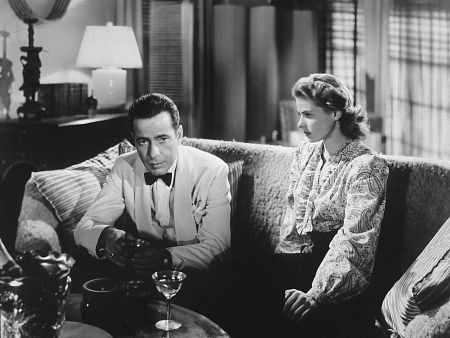The success of Casablanca begins with its screenplay, sometimes considered the best ever put to film. Any competently chosen set of actors would have made a memorable product. When you throw in Humphrey Bogart's letter-perfect performance, a wealth of characters which none are wasted, the backdrop of the war, and the timeliness of the content, you have one of the greatest films ever made. The war was still going on when this film was being shown.
Rick Blaine is an American ex-pat who fled the Nazi occupation of Paris and worked with way to North Africa. How he made his money or why he can't return the US is never explained... although the reasons are likely related. As the title sequence explains, many refugees planned tortuous escape routes that involved cities like Casablanca in French Morocco. Rick owns a cafe and he is well aware of all the business being conducted. He certainly has no admiration for the Nazis but he doesn't want to get on their bad side either. It would be bad for business.
The main story involves two letters of transit that were stolen from two murdered German couriers. These letters can get anyone out of Casablanca without question. (A bit of a stretch, I know.) These are brought to Rick by his twitchy acquaintance Ugarte, who is looking to turn a huge profit and then get out of town. Of course his plans are hopeless and the Germans are already tracking him down. He is arrested and Rick refuses to help (as if he could). The letters remain in Rick's possession, and stay hidden even though everyone seems to know that. He doesn't have any plans for the letters - he isn't interested in profit.
The German Major Strausser comes to Casablanca for a not very cordial visit with the Vichy authorities. He is interested in apprehending a Czechslovakian freedom fighter on his way to America. Most of the information is told in conversations involving Rick, Strausser, and the French official Louie Rainer. The way both Rick and Louie express subtle contempt for the Nazis is really fun to watch. Strausser is constantly rolling his eyes but can't do anything because he needs their cooperation. Their verbal sparring continues even without the German. While they are friends, they are still constantly trying to get information from each other.
So many characters, each memorable in his or her own way. There's the piano player, Sam, who has known Rick at least since their Paris days and maybe longer. His reactions provide some of the most endearing moments. Rick has three other employees: Carl, Sasha, and Emil, all who exhibit some personality along with good one-liners. The rival bar owner Ferrari whose has ingratiated himself with the local culture and is constantly looking for more opportunity. There's the Bulgarian couple who is out of funds and the wife must test her moral boundaries. The bitter French socialite who foolishly expected a commitment from Rick. Other refugees with stories but not named. Every line earns its place in the script. And many of the extra were successful refugees, making scenes all the more poignant.
Victor Laszlo appears at the cafe with his young companion Ilsa. Sam recognizes her immediately. Not a good sign. After Laszlo circulates the place to get information, Ilsa calls Sam over. He doesn't deny that Rick is there. She requests an old song that he really doesn't want to play, but she's a customer, so he does it. The song is the classic "As Time Goes By" and Rick isn't thrilled to hear it again. He storms out and locks eyes with Ilsa. No words. None needed.
Eventually, we get the backstory. Rick and Ilso were together in Paris but agreed not to share details about their pasts. After the Nazi invasion became imminent, Rick had to leave due to his subversive activities. Ilsa plans to leave with him, but no-shows at the train station leaving a note with no real explanation. While their interaction at the cafe is cordial enough and Rick expresses his admiration for Laszlo's work, he knows that she will not leave it there. After the place closes, he gets drunk and ignores Sam's attempt to snap out of it. He knows she's coming. And he's right. But the conversation doesn't go so well.
Ilsa realizes she can't talk to Rick, drunk or sober, and sets about getting her and Laszlo out of town. The task proves nearly impossible, as even the black market cannot risk the Nazi wrath. Tense conversations with Strausser make it clear that Laszlo's days are numbered if he stays. Eventually, it becomes clear that only the letters of transit will get the couple out of Casablanca. And that means dealing with absolute last person Ilsa wants anything to do with.
The final part of the film involves various entreaties to Rick's humanity and patriotism and him refusing to show his hand. Laszlo does not back down to the Nazi presence. And Ilsa is genuinely conflicted about her love for Rick and her obligations to her husband and the Resistance. This leads to the iconic final scene and the recognition that neutrality is not an option.
Casablanca never gets old. It has created a new following in every generation. It is often used as a "gateway" for people who don't like black-and-white movies. And it's part of the reason that the golden age of film will never be forgotten.
